WITH LUPUS







As I reflect on the past year, I have made it no secret as a fellow Lupian that I suffer from depression. Truly, it is a day-to-day struggle, and many of you share this battle. I have, with the help of therapy and medication, been able to manage it. Often, I reflect and rest on the “half glass vs. full” concept. Still, I can’t help but look at this past year that came with a host of ongoing challenges including the bad news in our world - from political polarization (elections), natural disasters, economic uncertainty, wars, and escalating rates of anxiety and depression.
On top of this we are still dealing with personal losses in the wake of the COVID-19 pandemic, and we are still searching for our new normal. To put it mildly, it has been a rough year.
So now what? The year is coming to an end, and the holidays are upon us. This time of year comes with reflections, both good and bad; and still we are all asked to be upbeat, positive and focus on gratitude, giving, joy, families, friends, and everything happy. Ok! I give up. I am in. Being down and blue is not a good fit for me. So, let us get to work and ask some researchers about switching things up a bit.
I have researched some articles to share with you on gratitude.
Research (Lyubomirsky & Nolen-Hoeksema, 1995; Williams, Teasdale, Segal, & Kabat-Zinn, 2007) has found that concentrating on what is going wrong does not help. We can get trapped in a negative spiral of worry, anxiety, and self-criticism. Psychologists call this rumination, which undermines our ability to solve our problems. Research has also found that in troubled times, appreciating the good in our lives can expand our awareness, help us cope, and reveal new solutions (Berrios, Totterdell, & Kellett, 2018; Fredrickson, 2009; Hurley & Kwon, 2013).
Try the following:
• Make an effort to notice the good.
• Learn to reframe bad situations.
• Adjust your expectations.
• Celebrate the little things.
• Surround yourself with grateful people.
Who wants to be down and blue? No one really, therefore I asked my staff to do a magazine issue called, “That’s a Wrap,” focused on gratitude; and I asked them to gather all the good things we accomplished in the fight against lupus this year. I was pleasantly surprised by all the data they shared with me.
Just FYI - it was a difficult year for the Foundation. We had staff coming and going. Donors’ dollars were at an all-time low (we feel it is because of the economy). Our pharma funders decreased their giving this year causing a reduction in programing. The staff themselves were plagued with many of their own personal issues in their lives including family and health. Our fundraising events failed to meet the goals we set. Yet, the need for programs and services rose.

Even with all the above, after I read all the great things we did with the little resources we had, I was pleasantly surprised with all of them. Simply put, I have to rejoice and put gratitude on the top of my list.
Please pay special attention to the patient story from Brittney Bailey. Brittney is an incredible warrior with a long LFA affiliation. She has been an advocate since she was a teenager and has served as a patient navigator, co-facilitator for a support group, attended many walks and educational programs, and even served as a member of the LFA Advisory Committee for Teens with Lupus. I am so proud that she has survived and thrived throughout all of her challenges and honored that she shared her story with us.
We made great strides in funding research and advocacy on a National level, even though the world was full of challenges.
I need to take my “blue” hat off and look at my glass and remind myself that it is half full, and the world is a better place because of the work we do.
My gratitude glass is overflowing with appreciation of the LFA, GOC staff for their dedication and passion to serve all of us, while they themselves have had their own blue days. My gratitude to all our volunteers and to those who continue to support us (no matter the size) via many fronts: walk, golf, donor dollars, annual appeal, Giving Tuesday, etc.
Yes, this past year was an off year. Now, I am rolling up my sleeves as we look towards 2025. I look back at a nursery rhyme that my husband always says to me when I am down.
“If I were a Shepherd I would give you a lamb. If I were a wise man I would do my part. What can I give you? I give you, my heart!”
I am grateful that I have been able to lead this chapter during difficult times and still be able to be effective and help my fellow lupians have a better tomorrow. Today, I give you my heart.
Full of gratitude for having you all in my world.
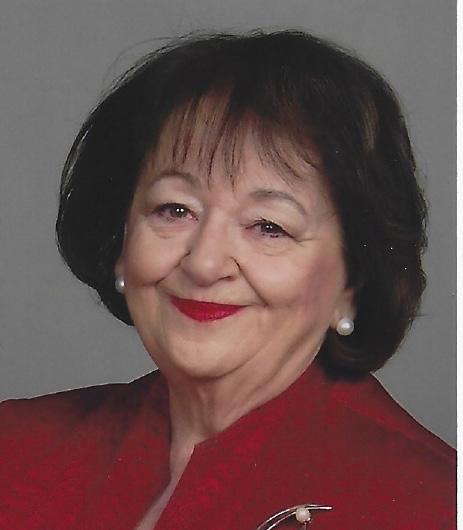

Suzanne Tierney President & CEO
Lupus Foundation of America, Greater Ohio Chapter

















Pg. 1-2 Letter from Suzanne
Pg. 4-5 Patient Navigator Corner: Nov 2024
Pg. 30 Staff Page 2526 1517 Gifts for Lupus Patients Memorial and Member List 11-14 Patient Story: Brittney Bailey 2122 Gifts of Gratitude
Pg. 6-8 Year-end Recap: Look What We Did!
Pg. 9-10 Patient Story: Aletha Acree
Pg. 11-14 Patient Story: Brittney Bailey
Pg. 15-17 Gifts for Lupus Patients
Pg. 18-20 Research and News
Pg. 21-22 Gifts of Gratitude
Pg. 23 31 Days to A New You
Pg. 24 Lupus Crossword Puzzle
Pg. 25-26 Memorial and Member List
Pg. 27 Blog & Podcast
Pg. 28- 29 Could You Have Lupus?

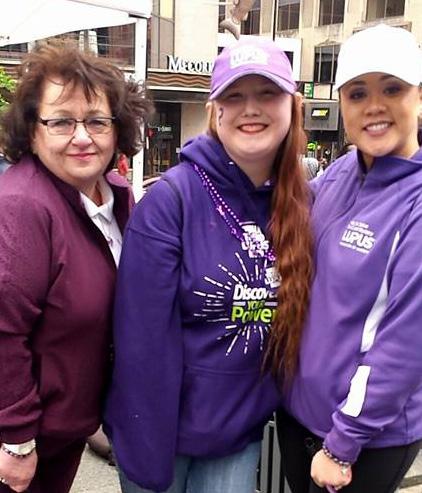


The Patient Navigator program is funded in part by Aurinia Pharmaceuticals and an earmark from the State of Ohio and managed by the Ohio Department of Health.

As 2024 is coming to an end, many of us take time to reflect and look at the work we did during the year. The patient navigators at the LFA, GOC were busy providing education, information, resources, and support to our constituents throughout the state. We would like to share with you our accomplishments over the past year.
Our chapter’s fiscal year began on October 1, 2023 and ended on September 30, 2024. During this time, the patient navigators made wellness calls to lupus patients during October-November 2023 and March-April 2024. The purpose of the calls is to attempt to check-in with lupus patients to see how they are doing and to ask if there is anything we can do to help. If there is no phone number or if the patient navigator cannot reach the patient by phone, then we attempt to reach out with an email (if an email address is available) and sometimes by text message. We mail information too and sometimes provide assistance in person. We also keep track of requests for information and assistance that the office or the lead patient navigator receives directly. In addition to providing help to lupus patients, we provide education, information, resources, and
support to caregivers and healthcare professionals.
Here are the numbers of individuals who we contacted or who contacted us during this past fiscal year:
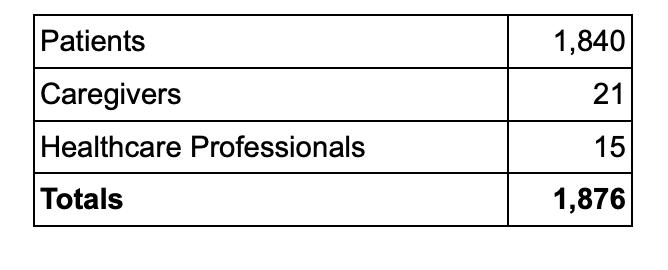
Patient navigators had 10,011 interactions. The following pie chart shows the different ways the patient navigators interacted with our constituents. We often have multiple contacts with an individual constituent, which are reflected in the totals:
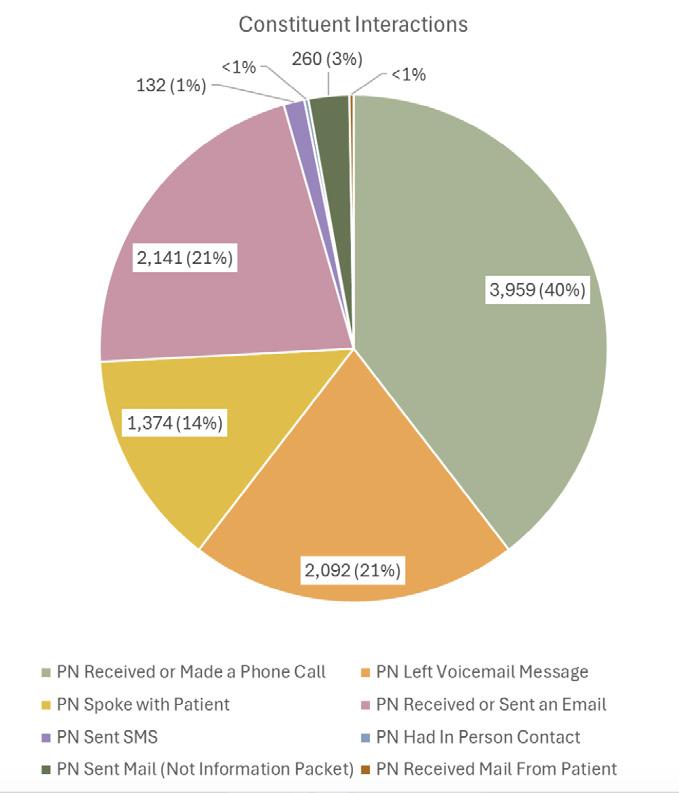
Patient navigators provided a variety of information and resources to patients. The following graph highlights some of the information and resources patient navigators shared:
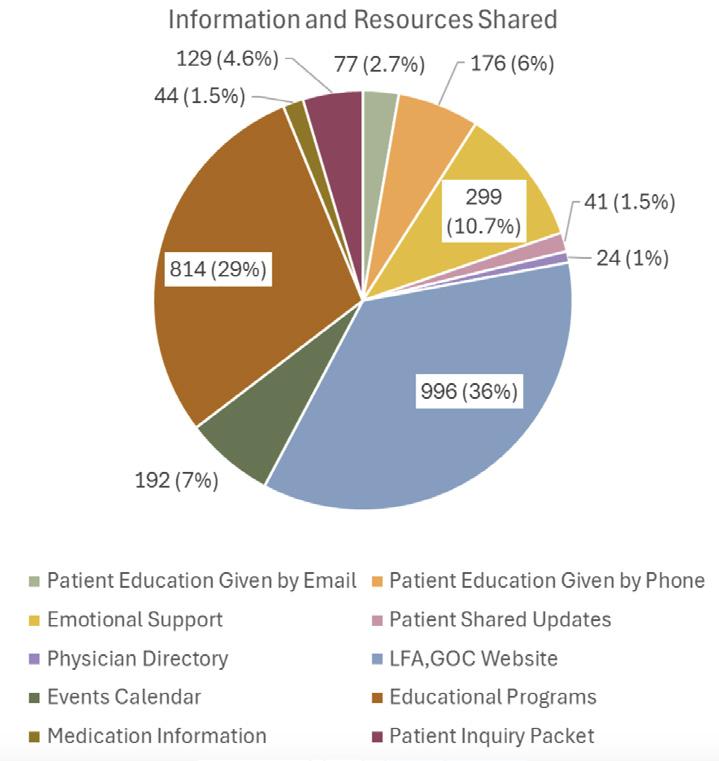
Patient navigators have also been successful in spreading awareness about our Patient Assistance Programs:
• Food Assistance (grocery store gift cards)
• Healthcare Transportation (Uber health rides)
• Medical (out-of-pocket healthcare expenses)
• Mental Health Counseling referral to Signature Health
If a lupus patient is interested in any of these programs, we ask them to complete the CASE SDOH Needs Assessment form (Case Assessment Systems Evaluation
- Social Determinants of Health). This is an assessment that collects information about barriers to care that a lupus patient may have. After the form is completed, a patient navigator contacts the patient and discusses their needs and the programs that best fits their needs. These programs are available while funding lasts. The assistance cap total per person is $200 every six months that can be used for up to three programs: medical, healthcare transportation, and food. For mental health counseling, the cap is one evaluation session and four counseling sessions every six months (if Signature Health does not accept the patient’s health insurance or if the patient has no health insurance).
Here is the number of patients who received help from our assistance programs:
• 83 patients who received up to $200 each in grocery store gift cards
• 12 patients who received up to $200 in Uber Health Rides
• 28 patients who received up to $200 in out-of-pocket healthcare expense reimbursement
• 13 patients who received referrals to Signature Health for mental health counseling
We are grateful that we have connected with so many of our constituents. We hope to continue to provide education, information,
resources, and support and to reach out to more lupians, caregivers and healthcare professionals in the coming year.
For more information or to speak with a patient navigator, please call us at 1 (888) NO-LUPUS, (888) 665-8787, (440) 717-0183 or email us at info@lupusgreaterohio.org. We’d love to hear from you!
The patient navigators wish you and your families a joyous holiday season and a very happy, healthy, peaceful and prosperous New Year!

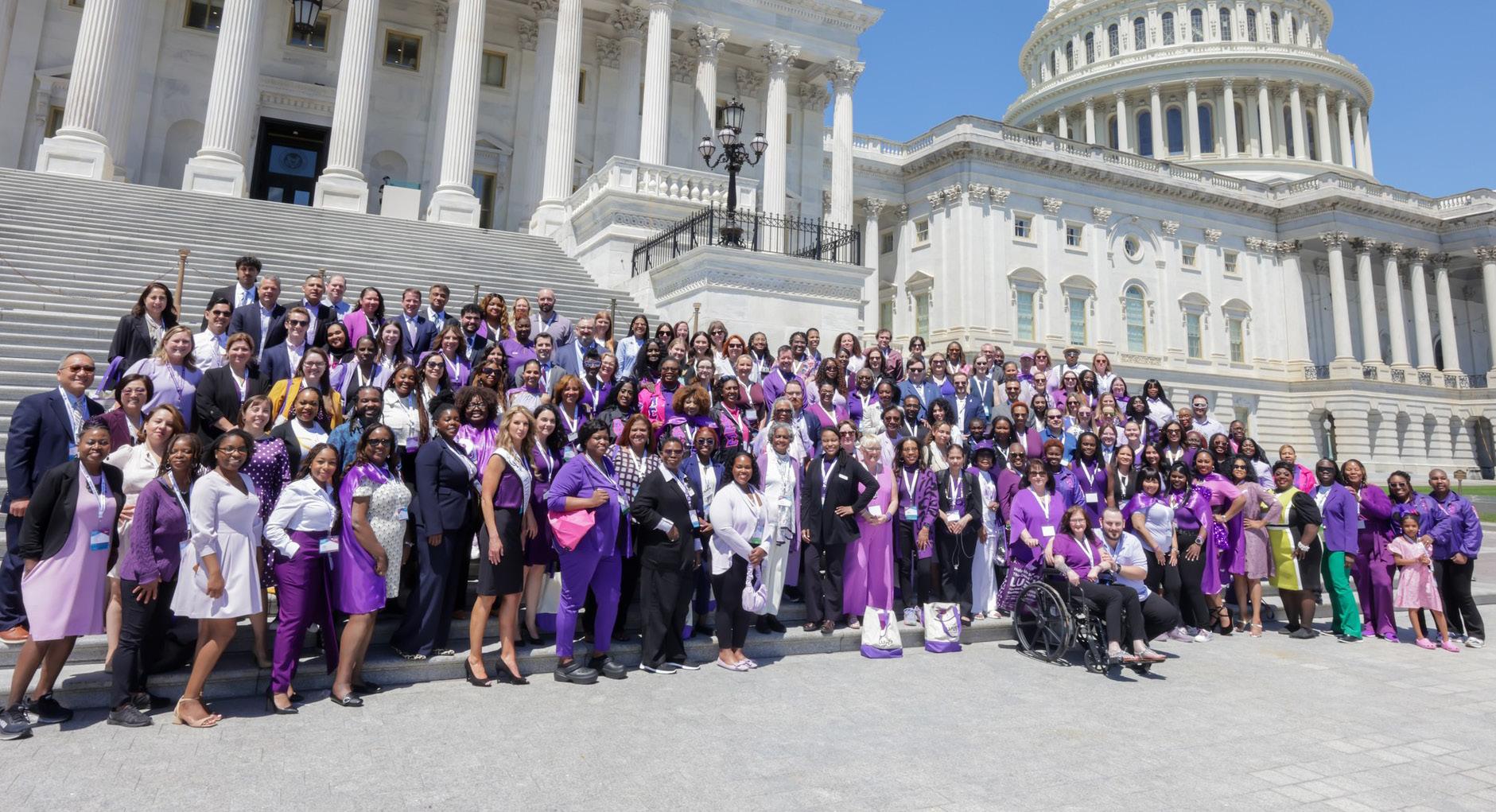
With the end of 2024 nearing and a new year approaching, it’s time to reflect on the past year at the Lupus Foundation of America, Greater Ohio Chapter.
The Walk to End Lupus Now®: Our most important event of the year is the Walk to End Lupus Now®. Though we didn’t meet our goal, we did bring in over $42,000 in Cleveland and over $18,000 in Columbus! With these funds, we will be able to continue holding support groups, educating patients, and providing the great work of our patient navigators. In addition, a portion of the proceeds go directly to fund vital lupus research. Both Walk days were beautiful, with clear skies and happy faces. We want to thank all of the walkers, volunteers, and sponsors for coming out and supporting lupus awareness! A huge congratulations to our top fundraisers this year: Terri Krieder, Stephen Perhach, Lisa Bordner, Kelly Perhach, Tiffany Thiede, Marybell Moyet, Leslie Tierney, Shawntee Johnson, Latasha Adams, Hannah Powell, Nicole Corley, Laura Biernacki, Shelby Seibert, Ariel Shelton, Tanya Quinones-Santiago, and Rosie Chapman. We could not do what we do without all of your support. Thank you!
Support Groups: We have 10 ongoing support groups throughout the year across Ohio. As a way to discuss lupus and the side effects that come from it, patients are able to use this space as a way to connect with other lupians. Our support groups are a safe place for lupus warriors and their caregivers to learn, receive support, and connect with others. Join us anytime. Check out our support groups at https://lupusgreaterohio.org/ find-resources/find-support/.
New Patient Education Program:
With the help of our lead patient navigator, Rita Piccin, BS, ND, RN, we educated new patients and their caregivers about lupus during our monthly new patient educa-
tion program. This class is a “lupus 101” that covers the basic information about managing the disease and living well. For more information, call 1 (888) NO-LUPUS.
Summit Events: Our lupus summits are the cornerstone of education here at the foundation. This past year, we held three major lupus education events. The first was the “Scaling the Lupus Summit”, which kicked off Lupus Awareness Month. The event, held at the Cleveland Clinic Administrative Campus on May 4, 2024, featured a panel of Cleveland Clinic physicians and had an audience of 39 virtual and 47 in-person attendees.

Our next education event was an entirely new format for us. Patients asked for the ability to have an open Q&A session with lupus specialists. We responded by holding our first ever lupus Town Hall appropriately titled, “What’s Up Doc?”. Our panel consisted of lupus experts from MetroHealth Hospital in Cleveland and was held on Saturday, September 7th, 2024 at the Rammelkamp Center on the MetroHealth Campus in Cleveland. We had 40 attendees from across the state attend.
Finally, we held our first in-person event since 2019, “Feed Your Mind”, in Cincinnati on Saturday, November 9th at Gratitude by Hilton. The event was a brunch and learn for patients and caregivers and featured University of Cincinnati Rheumatologist and Adjunct Professor, Nabeela Siddiqi, MD. It was special to see so many people come together in Southern Ohio and have open conversations about how lupus affects all of our lives.
Healthcare Worker Lupus Training Program: As part of our continuous commitment to raise awareness and provide education about lupus to healthcare professionals, we offered a free lupus training webinar to healthcare professionals throughout the state. We partnered with MetroHealth’s Office of Professional Affairs to provide 2.0 CME credits to 37 health-

care professionals who attended the webinar and completed a posttest and evaluation.
Could You Have Lupus? Self-Assessment Quiz: This online lupus self-assessment quiz is our initiative to raise awareness about lupus symptoms and help with our mission to reduce time to diagnosis. The quiz lists 15 common lupus signs and symptoms. If someone answers “yes” to four or more questions, we encourage them to bring their quiz results to their physician to talk about their symptoms and their possible risk for developing lupus. We are happy to report that 1,442 individuals took the self-assessment.
Patient Navigators (PN): Our ten patient navigators in Ohio work tirelessly to make sure that each lupus patient has a person they can call when they need assistance. This year alone, our patient navigators had contact with 1,876

individual patients, caregivers, and healthcare professionals with a total of 10,011 touchpoints. Our PNs are a vital part of our success story and help to ensure that the 66,000 patients living with lupus in Ohio have the resources they need.
Patient Assistance Programs: Our patient assistance programs in Ohio are critical to providing help for Ohio lupus patients who have barriers to care. This past year we have provided 83 patients with food assistance, 12 patients with healthcare transportation assistance, 28 patients with out-ofpocket healthcare expenses, and 13 referrals to Signature Health for mental health counseling.
Lupus Minority Wellness Event: In partnership with University Hospitals Cutler Center for Men, we kicked off Minority Health Month with “Passport to Health, A Route to Managing Your Wellness” on Saturday, April 6, 2024, at UH Drusinsky Sports Medicine Institute in Beachwood, Ohio. This event featured multiple wellness stations, on-site health screenings including urine protein to scan for lupus nephritis, lupus specialist guest speakers, strategies for managing wellness including tips on nutrition, exercise, and mental health. The day ended with raffle prizes and special guest Philly Weeden leading a Charg’d Up session with modified exercises for lupus patients. It was an incredible day filled with lupus awareness,
camaraderie, and over 200 attendees!
Combing Through Lupus: Our next Minority Health Month event was held on Saturday, April 13, 2024, and featured multiple salons across Ohio: Hairport Harbor in Cincinnati, Salon Patte in Wickliffe, Beauty Marks Salon in Cleveland, CrysStyles Hair Salon in Toledo, and Studio 32Nine in Toledo. Overall there were 88 attendees who gained more insight into lupus and learned about the potential signs and symptoms of the disease.
Golf Outing: On June 3rd, we held our annual Applied Underwriters Invitational Golf Outing. It was a fantastic day filled with great weather, golf, and a whole lot of fun! With help, we were able to raise over $47,600! We’d like to thank all of our committee members and sponsors who helped to make this event a success.
Living with Lupus Magazine: We designed, wrote, and published a total of four issues of Living with Lupus magazine. In the issues, we gave updates on lupus research, patients shared their lupus journeys, physicians gave much needed insight, and we gave tips to help live life better with lupus. Our magazines take an incredible amount of work and are a fan favorite! All of our constituents have access to our digital magazine, and hard copies are available for our members. If you are interested in sharing your lupus story, or becoming a member of the Lupus Foundation of America, Greater Ohio Chapter, please contact Alex: alex@lupusgreateroh.org or 1 (888) NO-LUPUS.
health professionals that help fellow lupus patients like her to understand their disease better. Patients appear on the podcast frequently to exchange stories with Suzanne. Some of our recent podcast topics include: Medicare Changes in 2025, benefits of a trust, and many patient stories. If you’re ever interested in appearing in a podcast episode, contact Alex: alex@lupusgreateroh.org or 1 (888) NO-LUPUS.
Blog: We continued our monthly Lupus Night Light blog and covered topics ranging from Applying for Social Security Disability, Getting the Most Out of Your Relationship with Your Lupus Doctor, Spring Cleaning Tips, to Living Fit with Lupus, and Assistance Programs for Patients. If you have something you would like to share on our blog, please reach out to Suzanne@lupusgreaterohio.org.
Lupus Awareness Month (LAM): LAM is always an exciting time at the Chapter. We held our kickoff month summit with the Cleveland Clinic, “Scaling the Lupus Summit”. We placed billboards throughout the state to shine a light on lupus and asked, “Someone You Know Has Lupus, Could it Be You?” We lit Terminal Tower purple in Cleveland for lupus awareness. We worked with area companies to produce statewide YouTube and Spectrum lupus awareness campaigns. And the most exciting thing we did for LAM was join fellow advocates at National in Washington DC to storm Capitol Hill, meet with legis-
lators, and raise critical funds and awareness for lupus. Suzanne, our CEO, was joined by Nikki Roberts, Rosie Chapman, Ariel Shelton, and many other patients and caregivers from Ohio. Collectively, the LFA had over 300 advocates attend in person and many more participated virtually.
Special Shout Out: We’d like to thank Aurinia Pharmaceuticals for their ongoing support of our many educational and support programs. From sponsorship of the Walk to End Lupus Now®, to their support of our many summits, and our patient navigator program, we truly appreciate their ongoing efforts to raise lupus nephritis awareness. In addition, we’d like to thank the Ohio Commission on Minority Health, the Ohio Department of Health, GSK, and AstraZeneca for their ongoing support and commitment to finding a cause and a cure for lupus.
It takes an army to do what we do and continue our mission of improving the quality of life for all people affected by lupus through programs of research, education, support, and advocacy. Each of you plays a role in executing our mission. We value all of you, and each phone call, each moment you share with us on your lupus journey, means the world. Thank you for being a part of the success of the Lupus Foundation of America, Greater Ohio Chapter.
Podcasts: We published a total of 14 My Lupus Living Room podcast episodes. During our podcast, CEO Suzanne Tierney talks to patients and health professionals all about lupus. She raises questions to


By Aletha Acree
Living with Systemic Lupus Erythematosus (SLE) brings countless challenges, from pain and fatigue to the uncertainty of flare-ups that can strike without warning. Yet, even amid this unpredictable journey, I’ve found that one thing can truly transform my experience: gratitude. This perspective shift hasn’t come easily – it’s a practice I’m learning to embrace, bit by bit. But gratitude has brought me a new sense of resilience and peace, reminding me that, despite the struggles, there is beauty to be found in each day.
Lupus has a way of reshaping your priorities. When flare-ups take hold, and my body feels like it’s working against me, I’ve had to slow down and re-evaluate. It’s in those slow moments that I’ve started to notice the little things that often go overlooked: the warmth of a sunny morning, the joy of a quiet cup of tea, the relief that comes from a kind word or a supportive message. Each of these moments is a gentle reminder that,
while my body may struggle, my spirit doesn’t have to.
Learning to be grateful for these small joys has helped me to focus on what I have rather than what lupus takes away. Instead of feeling trapped by the limitations of my condition, I try to see each day as an opportunity to appreciate the world around me and reconnect with what matters.
Living with a chronic illness like lupus has taught me the power of community. Friends, family, and support groups have become my lifeline. Even on my worst days, knowing there are people who understand my struggle and are there for me brings a sense of comfort I can’t easily put into words.
When I reflect on gratitude, I think about the people who have been there for me – the loved ones who make space for my pain, listen without judgment, and offer a shoulder to lean on. Their support has reminded me that while I may face this illness every day, I am not facing it alone. Each gesture
of kindness fills me with gratitude and renews my strength to keep going.
I also have found strength in my work at the Lupus Foundation of America, Greater Ohio Chapter. It was when I first came to the organization and met the CEO, Suzanne, that I found my strength. I realized that I had something to offer and I didn’t want to wait to die. So I began volunteering and eventually became a support group facilitator. Now, I work as the community impact coordinator where I am able to work with others to raise awareness and support those on their journeys with lupus.
Lupus often feels like a battle against my own body. Yet, as challenging as this relationship can be, I’ve come to see my body not as my enemy, but as a teacher. It’s taught me to slow down, listen more carefully, and honor my limits. By learning to respect the signals my body sends, I’ve found a balance that allows me to live more fully and feel more at peace.
Expressing gratitude for my body, even when it’s not at its best, has been a journey in itself. It’s not about pretending the pain or fatigue isn’t real; rather, it’s about acknowledging the resilience that carries me through every day, reminding me that I am still here, still trying, and still strong in my own way.
Living with lupus is difficult, but it has also made me resilient. Each challenge, each setback, and each painful moment has taught me something valuable about my own inner strength. In times of struggle, I remind myself of all that I’ve endured, and I feel grateful for the resilience lupus has helped me cultivate.

Though this journey is often hard, there’s a certain power in knowing that I can still find reasons to smile and moments to savor. Lupus may take some things away, but it has also shown me the strength that lies within, even on the darkest days. This gratitude for my own resilience is something I carry with me every day.
Perhaps one of the most valuable lessons lupus has taught me is the importance of the present moment. Flare-ups can make the future feel uncertain, and it’s easy to get caught up in what might happen next. But focusing on what’s within my control—like savoring this moment, this breath – brings a sense of peace that nothing else can.
Gratitude helps me stay grounded in the present. By focusing on what I’m grateful for right now, I feel more connected to the world around me and less burdened by the “what ifs.” In this way, lupus has become a teacher of mindfulness, encouraging me to appreciate each day as it comes.
Living with lupus is an ongoing challenge, but gratitude has transformed the way I face it. By learning to appreciate life’s small joys,

the strength of my body and mind, the support of loved ones, and the present moment, I’ve found a way to navigate this journey with a little more hope, grace, and resilience.
Gratitude doesn’t make the pain or difficulty disappear, but it brings a lightness that makes the journey more bearable. It reminds me that, even on the hardest days, there is still beauty to be found. And for that, I am grateful.
“Though this journey is often hard, there’s a certain power in knowing that I can still find reasons to smile and moments to savor. ”

I have always had minor health issues. I was 13 when I started to notice that my toes felt numb and were drained of color. It was uncomfortable, but I ignored it. They then started turning purple and would be so cold. I would walk around on my tippy toes trying to regain feeling in them.
The pain got worse and I went to my pediatrician. He told me I had Raynaud’s. He said I just needed to keep myself warm and that would make it better. After many months, it was so bad I went back to my doctor to ask if there was anything else I could do. He then noticed what I thought were “weird holes” on the tips of my fingers and said he wanted me to see a Rheumatologist at the Children’s Hospital. I wasn’t that concerned because I had no idea that there were diseases associated with Raynaud’s. I decided to look on the internet and found that there were many diseases that were associated with Raynaud’s. I started to get scared. A month after my first Rheumatologist appointment, I called about my test results. I knew that there was something wrong when they said they shouldn’t talk about it over the phone. They got me in the office within a few days. They told me that I had abnormal test re -
By Brittney Bailey
sults, and they thought I had lupus.
I didn’t know what to think, I had read horror stories online before even going in. Organ failure, short life span, death. I had just turned 16. I felt so overwhelmed.
I was eventually diagnosed with IST (inappropriate sinus tachycardia), POTS (postural orthostatic tachycardia syndrome), MCTD (mixed connective tissue disease), GERD (gastroesophageal reflux disease), lupus, Sjogrens, myositis, vasculitis, Raynaud’s, fibromyalgia, hypothyroidism, and interstitial
lung disease by the time I was 27 years old. Then the world fell apart in 2020 from Covid, and I didn’t go to the doctor for a long time.
I remember my boss getting upset with me because I was taking long breaks having to use the restroom, but I was working from home so it seemed like I was slacking and not working as I should be. I had stomach issues for a long time and chalked it up to my lupus, GERD, side effects from my medications, and honestly not the healthiest diet. However, the problems were


getting worse. They were affecting my ability to work. They were an interruption to my daily life. There was more than one occasion where I had unexpectedly lost control of my bowels and yet I glossed over it like it wasn’t a real problem. I knew I was sick; I knew that I probably wouldn’t get any answers from the doctor.
So I ignored it, put it on the back burner. Well 2 days after my 30th birthday, I woke up with horrible pain and a reality check. This was an emergency. It woke me up out of a dead sleep. I had a CT scan done that day and there was a mass in my abdomen. It was about the size of a ping pong ball and was wrapped up in blood vessels. Within a week I’d had a biopsy done, and it was confirmed that I had pancreatic neuroendocrine cancer. I met with the best surgical oncologist in the area, and he told me I needed to have a surgery called a Whipple procedure. This is a complicated surgery where they remove part of the stomach, pancreas, small intestine, bile duct, and the whole gallbladder (and obviously the cancerous tumor).
My mom said, “Her surgeon told us that everything should go smoothly with no complications, the only concern was possibly the steroid use. He said he would worry about that if and when it was a problem.” I was prepared for a 2-week hospi-
tal stay starting November 22nd, the day of my surgery.
Some of this information was passed to me from my family as I was very quickly too sick to completely understand what was going on. Several days after the surgery I got very sick, very fast. With a Whipple they have to cut out parts of all the organs around the cancer, and then put them back together with the small intestine. These new connections were all leaking into my abdomen. I had taken corticosteroids for over 10 years almost continuously, in varying dosages, to treat my lupus.
I knew I had a lowered immune system response and risk of bone and tooth damage, but I did not
realize the damage it could do to your organs. The steroids had to be stopped immediately after surgery which left me wide open for a lupus flare. My surgeon said my organs were like “wet tissue paper” and everything was falling apart as he was trying to put me back together. I had multiple drainage tubes trying to collect the excess fluids, but it wasn’t enough. I was put into a medically induced coma for 2 weeks. My parents said I was left surgically open during this time because they wouldn’t clear the fluid and infection that set in. They were going in every few days and doing a procedure to help clean me out. I woke up just before Christmas confused and in pain.
My body continued to struggle with sepsis, and I kept getting overcome by infection after infection. I was on a breathing tube. I was given a tracheotomy. My blood pressure and heart rate were all over the place. At one point my heart was stopping and they had to put in a pacemaker. The pain was indescribable. I couldn’t eat. I couldn’t drink. I was getting TPN, which is nutrition given through an IV. They would try to give me tube feeds through an NG tube and the feeds would spill right back out of my body through a fistula that had formed.
I was in an ICU bed until March 2023, unable to get up and stand. I developed foot drop on top of


my mounting medical problems. My feet began to curl in. I was moved to the Drake Center for Post Acute Care. I received physical and occupational therapy there almost every day until I had my next big surgery. On September 7th, my surgeon and his team opened me back up. They were expecting to be able to remove some of my drainage tubes and just fix the connections that did not work during my first surgery 10 months before.
There was so much scar tissue. My mom said it took 4 or 5 hours just to get through it. They later discovered my organs had all become stuck together and stuck to my skin. The protective lining between
my outer skin and intestinal lining was gone. They had to call in an extra surgeon to line my insides with a mesh material to keep it from happening again. My surgery took about 12 hours when they expected it to be done in 5 hours.
My parents recall meeting my surgeon after the surgery saying, “After the second surgery, Dr. Ahmad came out and told us it didn’t go as planned. Her organs were all stuck together.” My mom said, “I will never forget him saying that he had to at least give her a chance. A chance? This was my daughter he was talking about. It was the worst thing I had ever heard.”
I finally began to get better. I was able to eat small amounts of food again without throwing up. I was able to get rid of my feeding tube and TPN. The last big hurdle was my feet. They were contracted, so I was not able to put any weight on them. I had surgery on both ankles on December 2nd and it was much harder than I imagined after everything I’d already been through. Learning to walk again after not standing in over a year was grueling. I went to a skilled nursing facility that was meant to help me progress and go home, but they were negligent in my care, and I became septic again. I was rushed back to the ICU. Honestly, the next couple of months are a blur to me. I was hallucinating and very sick.
Finally, I cleared the infections. As if all my prayers were answered, all at once I started to make progress. I was standing. I was walking. I was learning how to go up and down steps again. In a matter of weeks, I went from having my second tracheotomy to being able to walk short distances with a walker.
Suddenly I was going home, after 556 days which is 1 year, 6 months, and 9 days. I’m continuing to make progress at home with occupational and physical therapy. I may have lost a year and a half of my life to being stuck in the hospital because of cancer, but I can promise you I’m going to live the rest of my life to the fullest. We are never guaranteed anything so we must do the most that we can, while we can. I feel truly blessed to be here today.
Reflecting on this ordeal my mom said “Brittney was so brave throughout this entire horrible journey. I never saw her cry, not once, although on many visits I would hide my tears. There were a few times we weren’t sure if she would make it. With faith and prayers, God got her through this. I will be forever grateful.”
David Emmett, Brittney’s father, shares his perspective as a caregiver. During this time in the hospital her mother and myself worked together to care for Brittney. I handled her cats and her home while she was away. When it came to her care in the hospital my main function was to tell Brittney stories. I tried to keep her connected to her family, her cats, and any crazy thing I could think of to engage her. We made a commitment to Brittney that was seven days a week for two years. I found that we were able to help Brittney most by being there and trying to help her stay connected to the outside world. Reassuring her she was going to succeed in this scary ordeal. I am sure that our efforts were extremely helpful in her eventual path to recovery. For me fighting through exhaustion and grief was the path to her success. I know that it was a million times harder for her than me, so helping her in any way I could was the only option. As a caregiver, my biggest hope was to give all that I could to have a positive result for Brittney.
Brittany’s Mom, Michelle Lee, shares her perspective on Brittney’s journey. My daughter has never had it easy. She has lived with many autoimmune diseases since her teenage years. I NEVER expected to add cancer to her list of medical issues. The surgery to remove her tumor was major and of course didn’t go as planned. She ended up in multiple facilities, trying to heal/recover for a year and a half. During this time, her dad and I were her main support. I went to see Brittney, whether she was coherent or not, every single day for 18 months. It’s what comes natural... a mom will always be there for her child.
It was the scariest thing I had ever experienced. Never would you expect at 30 years old, that your only daughter would literally be fighting for her life. She should have recovered within a few weeks of hospitalization and a few months of rest at home. The bottom line is, the medication that had helped
her survive throughout her years of lupus, had now unintentionally almost killed her. Her insides were mush from long term steroid use. This journey that we went through was emotionally draining. I watched my daughter fighting to breathe, she was on a ventilator more than once. I watched her gain 100 lbs within a month due to so many fluids being injected into her. I watched her losing weight drastically at other times due to malnutrition. She went many months without any food intake.
She was on TPN and feeding tubes. I watched the monitor in her room for hours at a time on days that she was sedated. Her respiratory rate was poor, heart rate always elevated due to POTS, her blood pressure running low. She was on pressers during the last couple of months of sepsis in the ICU. This affected every bit of her body from head to toe. At one point, they had monitors all around her head to check for seizures because she wasn’t talking or functioning right. That time it was a reaction to a medication. Her heart had pauses when she slept, so she had to get a pacemaker. Her feet and ankles were turning down and inwards.
She had been in bed too long and needed surgery to fix her feet. How does a mother handle all of this??!! Prayers and faith that God would let her make it through this. We had so much support from family, friends, and complete strangers. I documented it all on Facebook.
The outreach from the people you would least expect. Old neighbors, friends from elementary school who haven’t seen you in decades, etc. Brittney and I were both blown away by the support of others. I never let her see me cry. How could I break down in front of her, when she was so strong and never broke down in front of me?
Sometimes, I would walk in her ICU room, and it was as if I was in a dream... living a true nightmare. Infections were constant. We always had to be covered with PPE, for her protection and ours. She had open wounds that weren’t healing. At one point, she had 10 drainage tubes coming out of her. This was all too much to handle. But, you do it. You get up everyday and you stay right by her side until the end. You never give up. And she didn’t.
She is a true warrior. She doesn’t realize what an inspiration she has been to all of us. If you asked her, she would say, “I didn’t have a choice... I’m not ready to die.” She is now at home recovering. Back with her two cats that she missed dearly that whole time. I still go over everyday to help her get her day started. She has OT, PT, and home health that come each week... and me.
A mom who will be there for her as long as she needs me. I’m blessed to still have her. Never take anything for granted and thank God everyday for your blessings!


Lupus patients, like anyone with chronic illness, have unique needs. Sometimes this makes it challenging for friends and loved ones to think of gift ideas. We are here to help! Use this guide as a gift idea resource for the lupus patient in your life.
Lupus patients are notoriously cold. There are reasons for this including Raynaud’s, comorbidities like hypothyroidism, circulatory issues, anemia, temperature sensitivity, cold-induced spasms in blood vessels, and more. Help your lupus friend feel warm by buying them a cozy electric blanket. Weighted blankets are also known to help. Excellent quality large heating pads help keep lupus patients warm and keep joints from getting stiff. Hunter’s socks with heated insulation prevent Raynaud’s attacks on the toes. Well-insulated gloves and hand warmers


also make great gifts. Pro-tip: add a candle, tea bags (avoid echinacea), a mug, and hot cocoa, to make it a gift basket!
Lupus patients are plagued by chronic pain in the joints, muscles, and bones. They live with constant fatigue and struggle to make their bodies work. These girlies (and guys) deserve a spa day. Call ahead and arrange a day of pampering or buy them a gift card to their nearest spa. If a full day of pampering isn’t within the budget, consider gifting a lupus patient with scented Epsom salts or an aromatherapy diffuser. Essential oils like frankincense, eucalyptus, peppermint, and lavender are all good choices for inflammation. A high-quality lotion, acupressure foot slippers, and a warming neck wrap are also excellent selections for our friends with lupus.
Don’t forget about our hair care friends too. For those with hair loss, a consultation at a wig shop or with a barber or stylist familiar with lupus may give a lupus patient a confidence boost. Be sure to ask the patient gently if this is a gift they would appreciate. Hair loss is a sensitive topic with lupus patients. Other gift ideas for haircare include high-quality shampoo and conditioner, calming oils, and stylish headscarves.
The sun is the enemy of most lupus patients. But that doesn’t mean they can’t enjoy a fun vacation; they just need the right tools! Gift a cute sun-protective hat. Think about giving sun-protective clothing with built-in SPF. The Coolibar® brand has fashionable choices. High-quality sunscreen like Vanicream is gentle on sensitive skin but provides excellent coverage. Lupus patients always







need sunscreen! Also, contemplate buying your lupus friend high-end make-up with SPF. They can feel good on vacation, while also being practical and safe.
A cute umbrella can keep the sun away. Another idea is a chair with an umbrella attached. This works well at the beach and is also great for sports moms and dads. Lupus patients need to take their medicine. Consider the gift of an insulated medical cooler or case for lupus patients who carry autoinjectors. Search for Medical Travel Cooler on Amazon or Google, there are many to choose from. Another useful idea is a decorative and functional pill organizer.
For
Lupus patients often suffer from chronic pain and debilitating fatigue, and it makes cooking difficult. Consider gifting ergonomic kitchen tools such as easy-grip utensils, an effortless or automatic jar opener, a grip aid, a garlic press rocker, an onion holder for slicing, or a multifunction can opener. Another idea is a gift card to a meal subscription service, their favorite restaurant, DoorDash, or a similar service.
For the Fashionista
Make it your mission to find trendy clothes for your fashion-forward lupus friend. Think of cute scarves, trendy sweater vests, shawls or ponchos, fleece-lined leggings, and cute hats and gloves. Warm patterned socks and insulated boots are also wonderful ideas. A flannel or fleece pajama set will keep a lupus patient warm all night. Remember the slippers!
Remember SPF-protective clothing and large-brim hats for the beach. Long skirts and cover-ups also provide coverage and are on-trend. And sunglasses with 100% UVA/ UVB protection are always a hit! Buy cute accessories such as purses and totes that can fit medications, additional layers of clothing, and hand warmers. Buy something with a lupus awareness message or purple to support their fight like bracelets and tee shirts.
Are you struggling with gift ideas for your exercise-minded lupus friend? Buy a membership to their favorite studio or gym. They will thank you! Budget-friendly ideas include a new yoga mat, yoga blocks, low-impact weights, and resistance bands.
Patients may also appreciate an adaptive sports bra that closes in front or one designed to decrease pressure on sore shoulders.
Lupus patients suffer from flares throughout their illness. Sometimes they feel good, and other times they are actively ill and need time and rest to heal. This is when our book-loving friends need something to entertain them while they recuperate. Gift ideas include the next book in their favorite series, a motivational book, or a gift card to their local bookstore or e-book retailer.
If the person is new to lupus, book/e-book recommendations include The Lupus Encyclopedia by Donald E. Thomas, Jr., MD, FACP, FACR, and The Lupus Book by Dan-
iel J. Wallace, MD.
Another idea is to buy a decorative journal and pen set that patients can use to track doctor’s appointments, log symptoms, identify triggers, and keep a copy of their flare plan. Click the QR code at the end of this article to access the Flare Plan.
Your lupus friend isn’t a reader? There is something for everyone! For our Netflix and Hulu friends, gift them a subscription to their favorite streaming service. This will help them get by during flares. Pro-tip: make it an experience by adding an air popper and bag of popcorn for a healthy treat.
There is nothing better than a good night’s rest. According to experts, lupus patients need at least 7-9 hours of sleep per night. Why is this? In lupus, the body experiences inflammation, making the body feel more tired. Sleep helps to prevent flares, manage fatigue, reduce brain fog, and keep the immune system on track.
What kind of gift can benefit our lupus friends who need rest? A memory foam cervical pillow keeps the neck in alignment and reduces tightness in the neck. Side sleeper pillows are another great idea. The hips and spine stay aligned during sleep for a more comfortable rest. The pillows are also available with shoulder wedges for those with arthritis and rotator cuff issues.

Having lupus means periods of
flares and remission. Some things can help make life easier during flares, like a cleaning service gift card. This is the ultimate gift for a friend with mobility and fatigue difficulties.
A grabber tool is a budget-friendly suggestion. These handy devices help people pick things up when pain prevents them from bending over or reaching above. Another recommendation for a budget-friendly gift is a decorative medication organizer. Lupus patients need multiple medications to help keep their bodies in check. An organizer will help them arrange their pills in an easy location. Pro-tip: for those with secondary Sjogren’s or dry eye, include stocking stuffers of lubricating eye drops/artificial tears or sugar-free candy.
Lastly, consider purchasing an ergonomic cushion for back support. Sitting for prolonged periods
can make a lupus patient stiff. An ergonomic cushion will help maintain proper posture and alleviate pressure on the spine.
Give your favorite arts and crafts fanatic a gift they’ll love. Gift cards to Hobby Lobby, Michael’s, and online craft stores, will be a big hit. Other gifts like puzzles, adult coloring books, and scrapbooking supplies are a welcome distraction when chronic pain is particularly bad. If your lupus friend enjoys knitting or crocheting, think about buying spools of yarn in vibrant colors.
The most heartfelt gifts cost nothing at all. Make homemade coupons that the lupus patient can “cash in” throughout the year. Examples include a coupon for breakfast in bed or a home-cooked meal, an afternoon of yard work, cleaning the house, going to the
doctor, babysitting, and laundry. Other ideas include coupons for a foot or shoulder massage, a grocery store trip, or a fun-filled night out.
Lupus patients should avoid certain things to remain healthy. Here are gift ideas to skip. Anything that promotes eating red meat like gift cards to steak houses or a steak box. Tobacco and alcohol gifts are another no-no. Don’t buy anything that contains alfalfa, echinacea, or is high in saturated fat, or sugar. Finally, avoid gift cards from tanning salons or tattoo parlors.
***Disclaimer. The medical information provided in this article is for informational and educational purposes only and is not a substitute for your physician’s advice.



The U.S. Food and Drug Administration (FDA) cleared the investigational new drug application for Cullinan Therapeutics’ CLN-978 for the treatment of systemic lupus erythematosus (SLE). Researchers will initiate a global Phase 1 trial to evaluate the safety of CLN-978 in people with active moderate to severe SLE.
CLN-978 is an advanced, highly potent CD19 x CD3 bispecific T-cell engager designed to target and destroy harmful cells by binding to CD19 on B cells and CD3 on T cells.
It is engineered to have a very high affinity for CD19, allowing it to effectively target B cells expressing very low CD19 levels in vitro (outside a living organism or in an artificial environment) and in-vivo (inside a living organism). The structure of CLN-978 includes two single-chain variable fragments: one binds strongly to the CD19 target on B cells, while the other binds to CD3 on T cells, helping direct the immune system to attack harmful cells. Additionally, CLN978 has a single-domain antibody binding to human serum albumin
(HSA, an abundant protein in human blood plasma, which may help extend CLN-978 time in the blood stream). CLN-978 is administered subcutaneously, and the design permits more patient-friendly dosing and potentially reduced toxicity.
Continue to follow the Lupus Foundation of America for updates on lupus drug developments and clinical trials.
Learn more: https://bit.ly/3YWEh0A

In a new study, researchers investigated the prevalence of cardiovascular disease events (CVE) in people with systemic lupus erythematosus (SLE) looking at the risk based on sex, age, and race/ethnicity. Findings confirmed people with SLE have higher rates of CVE than the general population and revealed increased rates of CVE among younger men, Hispanic/ Latino ethnicity, and non-Hispanic Black race.
Researchers utilized data from the Manhattan Lupus Surveillance Program, a population-based registry of patients with SLE, for this
retrospective study. The study included 1, 285 people aged 20 and older living with SLE. Of the study population, 13.9% experienced CVE, such as myocardial infarction (heart attack) or cerebrovascular accident (stroke), with men having a 1.7 times higher risk and older adults over 60 years old having a 2.5 times higher risk. Compared to non-Hispanic Asian patients, the risk of CVE was 3.1 times higher for Hispanic/Latino people and 3.5 times higher for and non-Hispanic Black people. Overall, CVE prevalence was higher among people with SLE than the general population, particularly among those of
male sex, non-Hispanic Black race, Hispanic/Latino ethnicity, and in people aged 20-49.
Screening for cardiovascular disease is important among all people with SLE, but especially among those at higher risk. Current research shows that cardiovascular disease, is a leading cause of death in people with SLE which underscores the importance of taking proactive measures to maintain optimal heart health. Learn more about lupus and the heart.
Learn more: https://bit.ly/3Oj0RKZ



Systemic lupus erythematosus (SLE) predisposes individuals to early cardiovascular (CV) events, such as myocardial infarction (heart attack), stroke, and other thromboembolic events. Hydroxychloroquine (HCQ, known commercially as Plaquenil) is recommended for most individuals with lupus, as it is thought to mitigate CV risk factors and protect against CV events. In a recent study, researchers explored the association between HCQ and the overall risk of CV events in people with SLE and found that those currently taking HCQ had lower odds of experiencing a CV outcome than individuals not taking the treatment.
The cohort nested case-control study included 52,883 adults (86.6% female; 13.4% male) with SLE. Within the group, 1,981 individuals with CV conditions were matched with 16,892 individuals without CV conditions who served as controls. Furthermore, individuals were categorized into groups based on their HCQ usage: current users (taken within the last 90 days before a CV event), remote users (taken within the last 91-365 days before a CV event), and non-users (taken within the last 365 days). Researchers found that compared to non-HCQ users, HCQ users had a lower chance of experiencing a CV event, and were less likely to experience a myocardial infarction,
stroke or other thromboembolic event.
Cardiovascular disease is one of the leading complications of lupus. The findings of this study support continuous HCQ use for people with SLE to protect against CV events, however further studies are needed. Learn more about hydroxychloroquine and the impact of lupus on heart health.
Learn more: https://bit.ly/3YGMgxH

“Be thankful for what you have; you'll end up having more. If you concentrate on what you don't have, you will never, ever have enough. If it wasn't for my Family, LFA, GOC family, and my small circle. I wouldn't have anything.”
- Kelly Perhach
“I am grateful for my faith and my husband and children, who are my greatest joy. I am grateful that I can walk; though some days are hard, the good outweighs the bad.”
- @awf222
“Simple things give me joy these days. I am grateful to work for an organization that impacts positive changes for all those with lupus. The best part of my day is when I open my eyes in the morning.”
- Suzanne Tierney
“My grandkids.”
- @c1926j
“I’m grateful that I was diagnosed and informed about MCTD. Because I was hard on myself because I did not have the energy to do things. I am also grateful for not always having to be independent. I have people who are glad to assist me when they can.”
- Lea Thompson
“Living with lupus is a constant fight, but it’s one I face with gratitude. I’m often reminded of the many lives that have been lost to this disease. While lupus is unpredictable and can feel overwhelming, I’m grateful for the strength to keep fighting. Each flare and challenge is a testament to the resilience that so many in the lupus community embody. It’s a difficult journey, but gratitude for each moment of strength keeps me moving forward.”
- Norlynn Story
“My doctors. They listen to me and always try their best for me. They support me and cheer me on”.
- @lulu izy
“I have gratitude for simply just being able to get up and function to the best of my ability day by day while dealing with lupus. I’m grateful that I had a mother who understood and loved me enough to walk the lupus journey while she dealt with lupus and cancer. I’m thankful for the Lupus Foundation all over the world for all the hard work that they do keeping us informed of everything possible to help this journey not be so hard.”
- DeVonna Glenn
Take time to make yourself happy!
Identify areas in your life you want to change.
Donate a bag of old clothes to a local charity.
Meditate for ten minutes. Stay present!
Clean one of those hard-toreach places.
Be more organized. Buy a daily planner for the new year.
Remove 7 items from your home that don’t bring you joy.
Replace negative thinking with good thoughts.
Welcome your beautiful future by practicing self-visualization.
Make time for something you always wanted to do.
Treat yourself to something extra!
Set aside time to cook your favorite meal.
Practice yoga or another form of mindful exercise.
Replace a bad habit with a healthy one.
Bundle up and go for a calming walk.
Write down 10 things you would like to do in the new year.
Reach out to an old friend that brought you joy.
Design a morning ritual that includes at least one selfcare activity.
Learn something new! Embrace a continual learning mindset.
Be accountable. Own something you’ve done and apologize for it.
Spend more time with family.
Set healthy boundaries by communicating your needs.
Embrace a new form of technology.
Bring joy with you everywhere you go.
Download an app that will help you stay on track.
31 26 30 29 28 27 21
Welcome in the new while having gratitude for the past.
Carve out time to process grief.
Schedule an important doctor’s appointment.
Acknowledge that you can’t do it all and accept it!
Listen to a friend who just needs an ear.
Go to a support group.


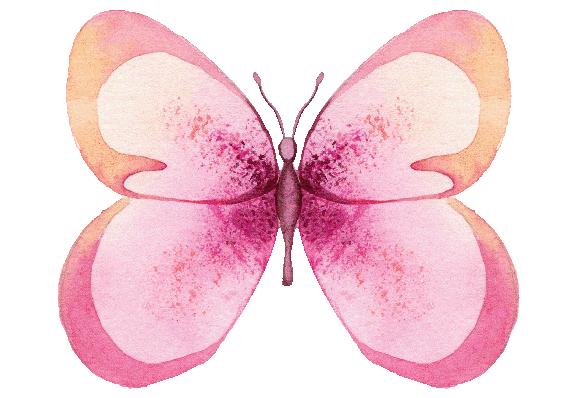
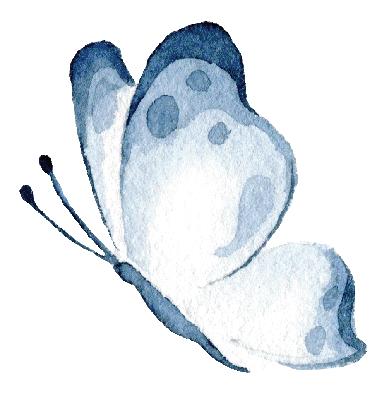
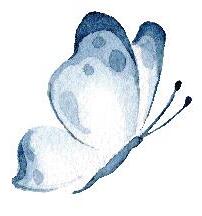
2. In amation in one or more joints.
3. A cream or lotion rubbed on the skin to protect it from the sun.
8. A condition that causes blood vessels to narrow, reducing blood ow to the extremities.
9. It is recommended that lupus patients get 8-10 hours of this per night.

1. A sudden appearance or worsening of symptoms of a disease.
4. When your immune system attacks the healthy cells of your organs and tissues by mistake.
5. A painful sore inside or outside the body.
6. A type of lupus that causes a skin rash that won’t go away.
7. A type of lupus that impacts the kidneys.
10. An antibody that attacks the body’s own tissues.
11. A red, at rash that looks like a butter y across the nose and cheeks.
12. A physician specializing in rheumatic diseases.

We honor those who are gone, but not forgotten...
Mary Stigamier
Beverly Walker
Anna Kish
Theresa Knezevic
Nancy Hagelbarger
Echo Brown
Marlene Stambaugh
Mel Lowe
Angela Morris
Tameka Nicole Carter
Willie LeSure
Tasha Lynn Smith
Nicole Lupe (Ramos) Soto
Maxine L. Caudill
Derrick “Demo” Christopher Morris
Roger Carl Beaverson
Boyd “Ed” E. Clapper Jr.
Catheryn Marie Allen
Gwendolyn Johnson
Jardaia Mason-Owens
Alejandra Marisol “Ali” Valentin
Karen Lee Ellis Falconi
Joyce A. Truse
Nancy Axelson Hagelbarger
Debra A. Klutarich
Errica Elaine Bradford
Carol Elizabeth States
Willishia Freeman
Ronald Judge
James Judge

Gina Bierman
William and Suzanne Tierney
William and Leslie Tierney
Doug and Kathleen Holmes
Carole Kopnicky
Neva Pawlikowski
Jacqueline Sopko-Crolius
Elizabeth West
Jerome and Barb Wiedman
William Ledger
Dr. Stanley and Doloris Ballou
Roger Evans
Rochelle Truskolaski
Maurice Fabbro
Fran Fisher
Lou Freiberg
Richard Horvitz
Dotty Kaufman
David Mandel
Gerald Molitoris
William Omahen
Raymond Sarria
Helen Talarico
Joyce Truse
Jeffrey Wisnieski
Carol Hoffman Vicario
Janice Hlavaty
Donald Calkins
Virgil and Bev Humphreys
Thomas Stahl
Mary Louise Bleile Baltes
Toni Mckenzie
Mary Alice Garey
Carolynn Bennett
Bela Vinczi
Bonnie Harris
Carol Everett
David Masciarelli
Susan West
Maria Woyma
Marie Edwards
Sam Sylk
Joe McMullin
Mary Dzigiel
Thomas Pindroh
Arya Askari
Ali Askari
Rita Janicki
Richard Ranallo
Patrick Sweeney
Barbara Wonsetler
Maryann Lape
Jeannine Valenti
Mary Cay O’ Malley
Michelle Gaffney
John Peters
Kenneth Wayman
Linda Steele
Mark Wester
Pam Honsa
Charlie and Toni Koleno
Anthony Sagaris
George Sagaris
The Mark Wester Family
The Greg Wester Family
Suzanne McGinnis
Jenny Demuth
Greg Petrus
The Genovese Family
Roy Hurley
Joyce Hale
Laurie Kemer
Sandra William
Theresa DeMarco
Kathryn Ellis
Ashley Tabar
Amanda Baltrucki
Eugene Kyles
Kathy Merriner
JD Robinson
Kathleen Weiss
Sue Slater
Judy Hronek
Felicia Acord
Mychal Dennis
Lynne Hutchison
Beatrice Tec
Susan Bader
Janice Washington
Lisa Evans
Ruth Whiley
Sharon Renee McRary
Dr. Anthony Fernandez,
M.D., PhD
Lee Hebert
Jeff Hesler
Daniel Sarich
Cynthia Wuertz
Sandy Matthias
Marlene Herman
Carolyn Vander Stouw
Kathleen Russell-Rader
Dori Lynn White
Charles Marshall
Jeannette Chicoine
Sharon Petit
Rachel Scava
Jim and Judy Shiner
Mark Shelton
Thomas Surovey
Gwen Ford
Cobb Ford
Vasile Peicu
Nancy Goldberg
Katherine Littman
David Stewart
Linda Earhart
Jenny Senyitko
Bryan and Linda Knepper
Judy Martin
Karen Braatz
Roxanna Giambri
Ron Kubinski
Connie Hassing
Dorothy Anderson
Dave Benning
Carey Bailey


If you would like to share your story, or have a topic you think would benefit lupus patients, contact our show’s producer Alex by email: Alex@lupusgreaterohio.org
Check out our channel: @lupusgreateroh
Suzanne sits down with Dr. William Fikter, a Psychiatrist, with Signature Health. They discuss the challenges that lupus patients may face with mental health and the ways that Signature Health and the LFA,GOC can help!
In this episode Suzanne is joined by Chad Limones, MBA from Aurinia Pharmaceuticals to discuss lupus nephritis. The two have a broad conversation about what exactly lupus nephritis is, the warning signs, and what resources are available for patients that have been diagnosed or suspect they have lupus nephritis. The information discussed is not meant to treat, diagnose, or otherwise recommend specific treatment plans to patients. Always discuss what options are best for you with your medical team first!
Suzanne is joined by Becky Hayward, The Outreach & Education Supervisor, from the Ohio Senior Health Insurance Information Program (OSHIIP). Becky discusses important changes coming to Medicare for 2025 that patients will want to consider during this open enrollment season!
Our blog, Lupus Night Light, is a place where we share stories and practical advice from patients that they have learned along their lupus journeys. You will find stories of triumph, hardship, and everything in between. It is meant to be a cathartic journey for both the contributors and readers alike.
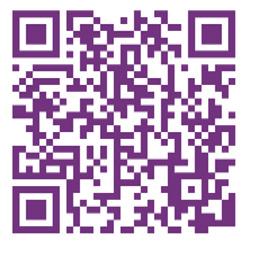
Lupus is a chronic autoimmune disease that causes inflammation in various parts of the body. The disease can range from mild to life-threatening. Ninety percent of those diagnosed with lupus are females between ages 15 and 44, but lupus also occurs in men, older people, and children. Lupus can be very hard to diagnose because symptoms vary from person to person, can come and go, and can mimic symptoms of other illnesses. is important to know the symptoms of lupus and to know if you are at risk for this disease. Here is a simple test to help you. Read each question and answer it in terms of your current AND past health.
Have you had a seizure or convulsion?
Have you had unexplained confusion that lasted more than an hour?
Have you had unexplained fever higher than 100º F/38º C for more than a few days that was not due to infection?
Heart
Have you felt chest pain while taking deep breaths?
Have you had a stroke or heart attack?
Have you been told you have protein in your urine?
Have you had swelling in your legs and ankles on both sides at the same time?
Blood
Have you been told you have anemia, low white cell count, or low platelet count?
Have your fingers and/or toes become pale or red or blue, or felt numb or painful?
Have you had blood clotting problems or a miscarriage?

If you have had any symptoms like these, especially if you have had several, talk to your doctor about lupus. Early diagnosis and proper medical care are the best ways to manage lupus.
Please turn over this page for more information.
Have you had sores in your mouth or nose that lasted more than five days?
Have you developed irritation or dryness in your eyes or mouth for more than a few weeks?
Have you had unexplained weight loss or abdominal pain or tenderness when your belly is touched?
Have you had stiff, tender, and swollen joints that feel worse in the morning?
Have you had extreme fatigue and weakness for days or weeks at a time, even after plenty of sleep?
Has your skin broken out after being in the sun, but it’s not a sunburn?
Have you had redness or rash across your nose and cheeks in the shape of a butterfly?
Have you had sores on your skin that would not heal?
Have you had sudden, unexplained hair loss?

Let's Talk About It Webinar Series
Living with Lupus Magazine
Lupus Night Light Blog
My Lupus Living Room Podcast
Patient Navigator Program
Educational Summits & Classes
Support Groups
Local State Advocacy Use this QR code to access program & educational resources.

The Lupus Foundation of America is the only national force devoted to solving the mystery of lupus, one of the world’s cruelest and devastating diseases, while giving caring support to those who suffer from its brutal impact. Through a comprehensive program of research, education, and advocacy, we lead the fight to improve the quality of life for all people affected by lupus. Contact the LFA or a chapter that serves your area to find out how you can become involved in our mission and how we can help you.
Suzanne Tierney, CEO/President Suzanne@lupusgreaterohio.org
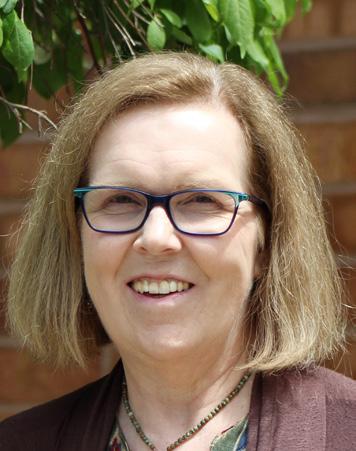
Kathy Holmes Finance Manager
Kathy@lupusgreaterohio.org
I was diagnosed with lupus in 1989 and joined the Lupus Foundation of America, Greater Cleveland Chapter the same year. I have been able to grow with the organization, as it became the LFA, GOC. Knowing how important it was to have somewhere to turn when I was first diagnosed is what motivates me to do all I can to help our chapter continue in our mission. Being in remission for the past 20 years has enabled me to take an active part in the growth of our chapter.

Mackenna Willis Creative Design Manager
Mackenna@lupusgreaterohio.org
I’m the marketing manager and creative developer when it comes to strategizing new ideas for Lupus awareness. As a graduate from Bowling Green State University with a BFA in graphic design, I’ve always envisioned utilizing my skills to make a difference. My enthusiasm to help others through design has always been a passion of mine and having the opportunity to share and grow with the LFA, GOC team has been nothing but inspiring.
I have spent the last 30 years dedicated to the lupus patients in Ohio. The goal is to provide a better quality of life until a cause or cure for lupus is found. My passion is providing programs to empower those affected by lupus so that they will have a better journey with lupus through education and emotional support. Lupus does not have to be a lonely, miserable, and misunderstood illness. My goal is to provide my chapter with the tools and resources to provide such services to all those in the state of Ohio.
Rita O. Piccin, BS, ND, RN Lead Patient Navigator /Outreach Coordinator
Rita@lupusgreaterohio.org

chapter continue to grow and help lupus patients for years to come.
I am a caring, collaborative, and resourceful nursing professional with over 30 years of experience in a variety of roles. I have a BS in Biology and French from John Carroll University and a Doctor of Nursing degree from Frances Payne Bolton School of Nursing at Case Western Reserve University. I am passionate about giving effective and empathetic customer service and education to patients, caregivers, families, colleagues and community organizations. I am honored to be a part of the LFA,GOC and dedicated to providing education, support, and resources to lupus warriors.

Community Outreach Coordinator
Aletha@lupusgreaterohio.org
two wonderful sons, they are the reason I fight lupus daily. I share my story everyday hoping that it might help or encourage someone else on their journey. I try to leave lupus patients with these thoughts and that is keep your environment positive in all aspects and do what you can

Chris Milazzo Event Assistant
Chris@lupusgreaterohio.org
Helping others has always been one of my greatest passions. After graduating from SUNY Oneonta with a degree in Media Studies, I knew I wanted to use my degree to do good. Being able to work for the LFA, GOC has been one of the most rewarding experiences in my career so far. It brings a smile on my face knowing that the work I do is able to help the lupus community of Ohio, and I hope to continue being a helping hand for the community.
